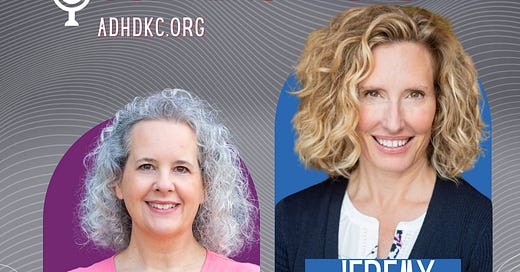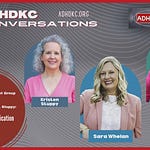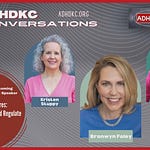Kristen Stuppy talks about the July Parent and Teen Group event: Mind Tricks to Improve Focus and Calm Your Brain. Learn more about it from our Parent Group or ADHDKCTeen pages.
Parent's Group
Our Parent’s group alternates between meeting online only and meeting both online and at Horizon Academy. All events are open to the public and free. Speakers are local professional volunteers or nationally known experts and vary monthly.
ADHDKCTeen
Calling all Middle and High School Students! ADHDKCTeen is our group for middle and high schoolers. Parents are welcome to join us to help reinforce skills learned at home in the following weeks. This group meets on the 1st Tuesday of the month unless otherwise noted. Meetings are always online and some also allow for gathering in person at
Transcript
Hi everyone, I'm Kristen Stuppy, a pediatrician who is passionate about ADHD and one of the ADHD KC board members. I last spoke with Jeremy Didier, my good friend and founder of ADHD KC, about our chapter's beginnings and how we've evolved over time. We're working on ways to get information to our Kansas City community and also anyone who can join us online. Today I'm going to try a new feature where we talk about our upcoming parent group speaker.
to learn more about what they will talk about and why they chose it as a topic. Yours truly is talking next month. So it's an easy way to introduce this new idea and try it out before we ask another volunteer speaker to do this. July 2nd, I will be talking to both our parent group and our teen group about mindfulness. Usually these groups meet separately, but summer's a busy time for everyone. So we expect smaller participant numbers and decided to combine the groups together.
going back to separate group events in August, and I'll talk more about that at the end of this. I chose to talk about mindfulness because as I was preparing to talk about anxiety, which is also one of the most commonly requested topics in our teen group, I realized there's too much to talk about in just a one hour session. I did talk about anxiety at our June meeting for both parents and teens, and because it was a parent meeting event, it was also recorded. You can see that recording.
if you go to our ADHDKC YouTube page or our ADHDKC website, adhdkc .org and look under resources and then there's a recordings and past events section. I do not typically record the teen sessions because they're interactive sessions and we need to maintain the privacy of the participants, but the parent talks are recorded for the
speaker portion, not the Q &A. So you still do get more if you go to the sessions live, if they are live available. But for those who can't attend, we know that there are lots of things that people get to do in this busy world that we live in, and sometimes they can't make a talk live, but they still want to hear it. So we do offer the speaker portion of the parent events as a recording.
Kristen Stuppy, MD (02:29.756)
So anyway, since summer's busy, I had planned to present both the parent and the teen groups in June and July and kind of did it as a part one, part two, even though they are completely separate talks. So in June, I talked about anxiety with a lot of why we have anxiety, how our body responds to anxiety and some tools that we can use.
to help to calm our brain down so we can then move forward, use the thinking parts of our brain. Part of the ways we can calm our brains down is to use some mindfulness tools, but there wasn't enough time in that talk to talk about it. So I'm gonna have a whole part two with just mindfulness. And I've known about mindfulness for a long time. Kind of on the surface, I knew that it's been around forever, Buddhist monks do it, but many other...
people not of a religious sect will also do it. It's withstood the test of time, so there's gotta be something there. And scientists have actually studied it and they now know quite a bit. And I was quite surprised when I started researching mindfulness, how much science there is to back this generations old practice. Something that we can all do on our own, maybe with some guidance and some learning
but it's something that any of us could do at any time of the day. You can do it while you're getting ready for bed. You can do it while you're brushing your teeth. You can do it sitting calmly in your room, but you can also do it while walking. Mindfulness is something that is helpful to anyone who gives it a try and puts an honest effort in. I've really become a true believer in it. And I've only recently started my own mindfulness practice. So I'm by no means an expert on the subject.
But I do wanna share some of the science of why it works, why it's lasted for thousands of years. This is not a passing fad, it's not a trend, it's something that is well established and we can all learn to use it and then get in the habits of using it. Scientists have found out so many physical changes in the brain and down to even our chromosomes, it's so amazing. And I do wanna share all of that with you because I think if you understand that it is a real thing.
Kristen Stuppy, MD (04:51.584)
that science actually supports doing mindfulness, then you might be more willing to give it a try. Because I know a lot of people with ADHD are like, I can't sit and focus for two minutes on anything. But you can train your brain to do it. And one of the best things with mindfulness is it has been shown to help people learn to refocus. So when somebody with ADHD loses the focus on what they're supposed to be paying attention to, they can bring it back more easily because they've been practicing how to do that. Because when you're being mindful of
whatever it is practice -wise you're doing. So you're doing a breathing exercise. You're being mindful of your breathing. And if a thought comes in, you just label it as a thought and you push it away, get back to your breathing. Most of the mindfulness, at least all the things that I have tried so far, again, I'm new to this as well, but they all have a focus of what you're doing. And if a thought comes into your mind or if you feel something,
you just label it and move on, get back to what you're doing. And so that helps to train people with ADHD who lose focus all the time to get back to what they need to attend to. And so that's a fantastic benefit of mindfulness in particular for people with ADHD, but it also helps people with anxiety, which we know also happens in people with ADHD quite a bit. So there are so many reasons to do mindfulness and we'll go through.
a few mindfulness exercises, just brief ones, to help learn what some of them are. And then I'm also going to do some brain tricks. And the brain tricks are there because they're fun. But also I want people to be able to see why our brain doesn't always do what we think it's doing. We think if we see something, we can believe in it because we saw it with our own two eyes. But what we forget is sometimes our brains play tricks on us.
That's why two people can remember the exact same event they witnessed from different perspectives. They have their own maybe background or bias towards it and they remember it very differently. I can think of many children who say, my mom always yells at me and the mother's looking like, I don't yell. And other witnesses might say the mother wasn't yelling, but the child perceives it as yelling because the way our brain works is that way. So we're going to play some mind tricks and
Kristen Stuppy, MD (07:12.256)
see if we can start to understand that our brains are not always exactly what we think they are. So during the talk, I will touch upon some of the science and do the mind tricks. I will also introduce some of the mindfulness techniques that are available and give some resources so that you can do this at home. You can start your practice. And I'm doing this because I really have become a true believer in the mindfulness.
Even though my practice is not perfect, I will say that I'm remembering at least half the days of the week at this point. I'm still not to every day, but I'm working on it. And that's all any of us can do is to continue to better ourselves. And mindfulness is one of those things that can definitely help us be better at regulating our emotions and focusing and our overall physical health as well. So I really do hope people can join me on July 2nd at 630.
Central Time and it'll be online only so you can join from anywhere as long as you have an internet connection and you can go to adhdkc .org events to find all of these signups. You will also be able to see August presentations as well and the August presentations are going to be at
physical location again and they're going to be separate. The parent group and the teen group are both going to meet at the same time on August 9th at 6 .30 p But the topics will be different. The parent group is going to be hearing Leila Lawson who is actually a police sergeant and she's a certified coach. She'll be talking about executive functioning which is again one of our more popular requested
topics. So I'm really excited for her to be able to talk and I will be talking to the teen group at the same time in a different location about medications. Managing medications is something as a pediatrician. I talk all the time to families and kids about side effects are there and if people have side effects I will touch upon the ways they can treat them in the office but there's never enough time to talk about all of them.
Kristen Stuppy, MD (09:37.952)
So I'll be able to spend an hour talking to teens and their parents who want to join that group instead of the parent group. Talking about medication management and side effects management. So July will be about mindfulness for both parent and teen groups. And that one's online only. In August, we're back to two separate groups in person and online.
The groups are gonna meet at the Anita B. Gorman Center, which is at 4750 Troust Avenue in Kansas City, Missouri. This is a new location for us. So I am excited to try a new location and it will still only be if enough people sign up. When we have in -person events, it takes a lot more than just that hour of the talk. People have to go early and get the room ready. They have to...
clean up afterwards, there's just more to it. So if enough people sign up to attend in person, then we will continue to hold the parent and the teen groups at the Anita B. Gorman Center. If not enough people sign up, we will still do the talks online. So when you sign up, you will also get a confirmation by the Sunday before the Tuesday event for the August in -person event.
but I do think the in -person events are beneficial, not just for hearing the speaker, but you can ask questions and interact with the other participants as well. Sometimes just being with your tribe, people who are going through similar things. These are all people who are affected by ADHD in one way or another, whether it's them personally or family members. So I am super excited to be able to be back in person and at a new location to see if that helps to get some more.
new faces at our groups. So I do hope that you can go to adhdkc .org forward slash events, find the parent group page and or the teen group page. Those will link you to our sub stack. We use sub stack to send out our newsletters. You can sign up for the newsletter if you click on that or you can pass through that. I know some people don't want to sign up for the newsletter before they actually read it.
Kristen Stuppy, MD (12:00.416)
So you can click out of that pop -up box and just go directly to the page, learn more, and then sign up. We do add people who sign up to our newsletter so that you can get more information about the next meetings. And you can always cancel out of that if you want to disenroll. But I do think that all of our events are worthy of at least learning about. So we'll invite you to those. So I hope you guys can join me in July.
on the second for the talk on mindfulness. I'm super excited about it. And then again in August for the talk about medication management. And then for the parents, join again for mindfulness July 2nd at 630. Or in August, parents can talk about or listen about executive functioning. Both of those will be great talks. I'm super excited for everyone to join us and I hope you can. Thanks.
















